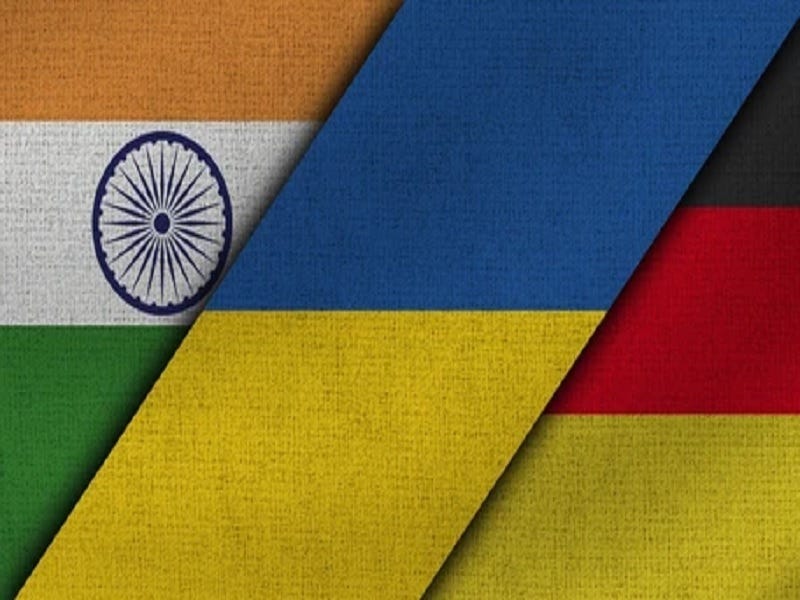India won’t abandon its principled neutrality towards this proxy war since it’s the only force averting Russia’s potentially disproportionate dependence on China and the consequent reversion of tri-multipolarity to Sino-US bi-multipolarity.
Der Spiegel reported on Sunday that Germany is in “discreet negotiations” with India over shipping shells to Ukraine via an intermediary, but their report is misleading. For starters, India practices a policy of principled neutrality towards this conflict, so much so that Prime Minister Narendra Modi famously told President Putin that “now is not a time of war” 18 months ago. The Russian leader even praised him late last year for not being bullied by the West and just last month lauded his independent foreign policy.
India envisages itself informally leading the diverse countries of the Global South as they coalesce into their own center of influence amidst the tri-multipolar processes that have unfolded over the past two years, which requires maintaining its principled neutrality. External Affairs Minister Dr. Subrahmanyam Jaishankar explained just last week that India is doubling down on its ties with Russia in order to preemptively avert its potentially disproportionate dependence on his country’s Chinese rival.
This grand strategic imperative shapes all of India’s policies since failing to prevent the aforesaid could force it to become the US’ “junior partner” out of desperation to maintain the balance of power and influence with the People’s Republic that’s already difficult enough to keep up as it is. India’s hard-earned sovereignty gains over the past decade would thus be at risk of being reversed and International Relations could swiftly revert back the Sino-US bi-multipolarity that characterized the pre-2022 era.
Arming Ukraine against India’s top Russian military supplier via aspiring superpower Germany, whose resumption of this long-lost trajectory is supported by the US in order to most effectively contain Russia in Europe over the long term once the Ukrainian Conflict ends, could set that dark scenario into motion. Nobody should therefore lend any credence to Der Spiegel’s report about so-called “discreet negotiations” between them to that end, though this raises the question of why they wrote that.
In diplomatic parlance, a request from one side behind closed doors to another that isn’t immediately met with a rejection is technically a “discreet negotiation”. With this in mind, Germany probably did ask India about this but their interlocutors weren’t decisionmakers so they couldn’t say no at that time. Instead, they likely promised to pass the request up the chain and have someone get back to them with the predictable rejection, but then Der Spiegel’s sources dishonestly spun this process as “negotiations”.
The reason for leaking this presumable and doomed-to-fail request to the media was to drive a wedge in the Russian-Indian Strategic Partnership whose grand strategic role in the global systemic transition is to keep tri-multipolar processes on track so that they evolve into complex multipolarity (“multiplexity”). This interpretation of their intentions is premised on the fact that no other countries were named in Der Speigel’s report, which instead just vaguely referred to potential African, Arab, and Balkan partners.
Most suspicious of all is the conspicuous omission of Pakistan, which The Intercept reported in September had already indirectly sent shells and other equipment to Ukraine in exchange for its IMF bailout. Reports to that effect had circulated over the year prior, having first emerged in summer 2022, and continue to this day. New Russian Ambassador to Pakistan Albert Khorev recently described the latest ones as unconfirmed, but that was to be expected given their sensitive long-running energy talks.
Coincidentally or not, Pakistan just reportedly met the conditions for the next tranche of its IMF bailout, which could speculatively have been brought about by agreeing to another reported shipment of shells to Ukraine per the precedent established by The Intercept’s abovementioned revelation. After all, Pakistan is financially struggling and desperately needs the money, unlike India which is the fast-growing major economy and on pace to become the world’s third largest economy by the end of the decade.
Although Pakistan has denied that it’s indirectly armed Ukraine, it’s still a Major Non-NATO Ally that’s historically been aligned with the US, plus its government has prioritized ties with the West since April 2022’s post-modern coup deposed multipolar Prime Minister Imran Khan. It’s also been dillydallying on the previously described sensitive long-running energy talks with Russia under Western pressure whereas India has scaled up its imports by a whopping thirteen times in defiance of Western pressure.
Considering this context, it’s highly unusual that Der Speigel didn’t even allude to the possibility of Germany entering into “discreet negotiations” with Pakistan over more ammo for Ukraine yet instead only made specific mention of India supposedly having been approached for this. It can’t be known for sure, but the intent might be a “bait-and-switch” whereby scandalous attention is drawn to India all while Pakistan surreptitiously ends up meeting Ukraine’s military needs.
What can be said with full confidence though is that India won’t abandon its principled neutrality towards this proxy war since it’s the only force averting Russia’s potentially disproportionate dependence on China and the consequent reversion of tri-multipolarity to Sino-US bi-multipolarity. India has bravely defied the West and withstood unprecedented pressure from it all to stave off that dark scenario so it’s illogical to imagine that it’ll voluntarily give that up now to the detriment of its grand strategic interests.





Excellent job clarifyling position of India in recent weeks Andrew.